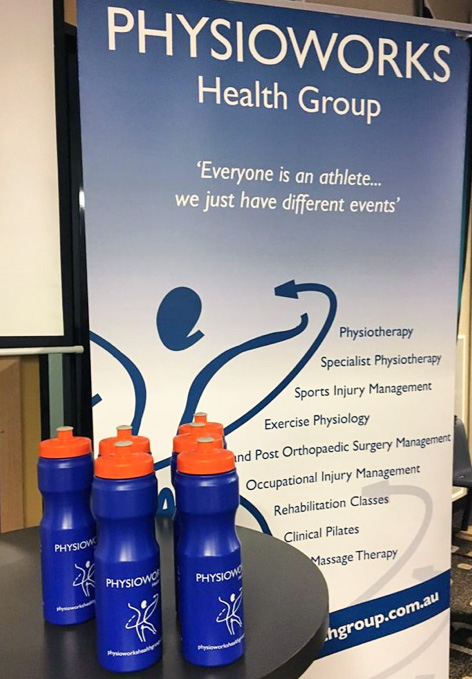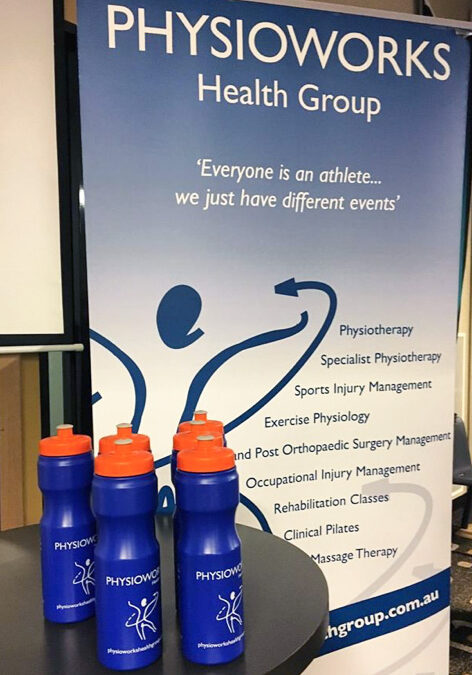Cricket, Tennis, Softball, Running, Biking….. With the summer sports season now upon us hydration is critical for optimum performance and well-being during exercise. Physioworks Helath Group APA Sports Physiotherapist Brad Fernihough looks at Fluid Requirements for Exercise in Heat/Humidity.
Loss Of Fluid Through Sweating
During strenuous exercise most of the heat produced is dissipated by the production and evaporation of sweat from the surface of the skin. To limit the rise in body temperature with intense exercise, even in mild climate conditions, high rates of sweat secretion is essential. If the exercise is prolonged, this leads to progressive dehydration and loss of electrolytes (mostly sodium and chloride). Some people may lose up to 2-3 litres of sweat per hour during strenuous activity in a warm environment.
SIGNS OF DEHYDRAYTION
MILD
- Thirst
- Dry Lips
- Slightly dry mouth membranes
MODERATE
- Very dry mouth membranes
- Sunken eyes
- Skin doesn’t bounce back quickly when lightly pinched and released
SEVERE
- All signs of moderate dehydration
- Rapid weak pulse (more than 100 at rest)
- Cold hands and feet
- Rapid breathing
- Blue lips
- Confusion

Dehydration as A Cause Of Fatigue
Fatigue towards the end of a prolonged event, especially in warm weather, is more likely to result from the effects of dehydration than from fuel/food depletion. A small amount of fluid loss can result in a large and exponential loss of performance regardless of whether the athletic endeavor is a sprint or endurance. Dehydration can have ongoing effects after the “hot day” due not being properly hydrated, which can have deleterious results in performance days later. To prevent dehydration, water must be replaced at a faster rate.
Fluid Ingestion during Exercise
Drinking fluid during exercise can help restore plasma volume to near pre-exercise levels and prevent the adverse effects of dehydration on muscle strength, endurance, and co-ordination. Dehydration also poses a serious health risk in that it increases the risk of cramps, heat exhaustion and life-threatening heat stroke. Relying on feeling thirsty as the signal to drink is unreliable as a considerable degree of dehydration (certainly sufficient to impair exercise performance) can have occurred before the desire for fluid intake is evident. Ideally, athletes should learn to consume adequate fluids during activity so that their body weight remains fairly constant before and after exercise.
However, it is generally recommended that approximately 500ml of fluid be consumed 2 hours before exertion, followed by another 500ml about 15 minutes before the onset of prolonged exercise. In hot and humid environments, frequent consumption (every 15-20 minutes) of small volumes (120-180ml) of fluid is recommended throughout exertion.
What Is The Best Drink Composition?
Water and electrolytes. Sugary drinks such as Gaterade, Powerade, V, and Redbull have far too much sugar for the needs of 99% of athletes who have a good pre and post dietary food intake.
Fluid Intake during Recovery from Exercise
In the post-exercise period, replacement of fluid and electrolytes can usually be achieved through normal dietary intake. However, rapid replacement of water and electrolytes in the post-exercise recovery period may be of crucial importance where repeated bouts of exercise have to be performed and there is a need to maximise rehydration in the time available. Optimal rehydration after exercise can only be achieved if the sodium lost in sweat is replaced as well as the water. The amount of fluid lost as sweat during exercise can be easily estimated from the change in body weight that occurs during the exercise period (after correcting for the volume of any drinks consumed during the exercise). Each kilogram of weight lost is equivalent to about one litre of sweat loss.
References and Further Reading :
- Gleeson M (1997) Fluid and micronutrient intake: needs for physical activity. British Journal of Therapy and Rehabilitation 4(5): 252-259.
- Gleeson M (1998) Temperature regulation during exercise. International Journal of Sports Medicine 19: S96-S99.
- Maughan RJ (Editor) (2000) Nutrition in Sport. Oxford: Blackwell Science, 2000.
- Williams C and Devlin JT (Editors) (1992) Nutrition for sports performance. London: E&FN Spon.
- Williams MH (1995) Nutrition for fitness and sport. 4th edition. New York: McGraw-Hill.







